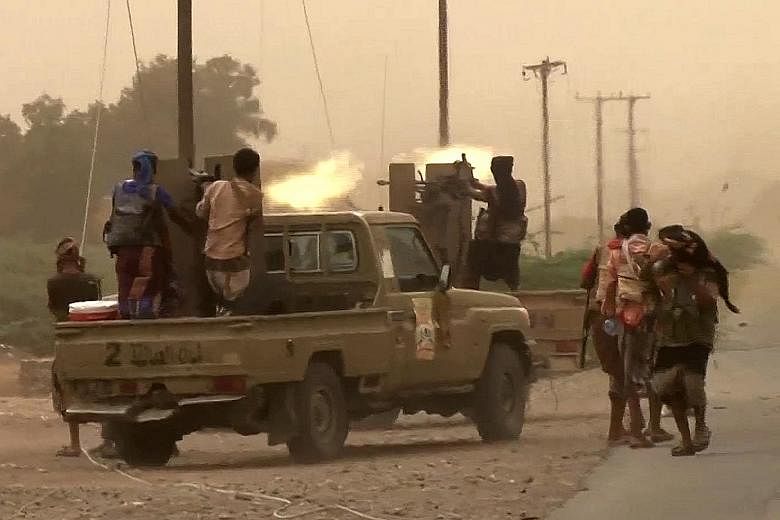ADEN • The Iran-aligned Houthi movement was fighting yesterday to keep a Saudi-led coalition from taking full control of the airport in Yemen's western port city of Hodeida, in an offensive the United Nations says could trigger a famine imperilling millions of lives.
The coalition is attempting to capture the airport in the well-defended city and push the Houthis out of their sole Red Sea port, in the biggest battle of the war. More than 70 per cent of Yemeni imports pass through Hodeida's docks and the fighting has raised UN fears of a humanitarian catastrophe.
"Death and poverty are all around us. We are scared to leave our homes after the fighting reached the airport," said Mr Abdelqader, a resident who used to work at a cement plant. "No work, no salary, we are just waiting for God's mercy."
Ground troops - which include United Arab Emirates forces, Sudanese and Yemenis from various factions - have surrounded the main airport compound, but have not seized it, a source in the coalition-allied Yemeni military and residents said. "We need some time to make sure there are no gunmen, mines or explosives in the building," the military source said.
The military's media office said technical teams were de-mining the surrounding area.
At least 139 combatants have already been killed, according to medical and military sources.
Mr Martin Griffiths, the UN special envoy to Yemen, arrived in the Houthi-held capital Sanaa as fears grew that fighting would sever the only lifeline to the vast majority of Yemenis.
Mr Griffiths is expected to propose to rebel leaders that they cede control of the Red Sea port to a UN-supervised committee to avoid further fighting with advancing government troops.
Fighting led to the closure of the northern entrance of Hodeida, which leads to Sanaa, blocking a key exit out of the city and making it harder to transport goods from the country's largest port to the mountainous regions.
Mr Aly Omar and his family spent three days trapped in the Manzar neighbourhood abutting the airport as fighting raged.
"We didn't have any food or drink or anything, not even water," Mr Omar said, standing in a hospital last Friday night beside his son, who was wounded by an air strike.
"I treated him on a bus after he was injured in an air strike, which is unacceptable. I call on the United Nations and the Red Cross to open a way for us to get out of the situation we're in. Our kids, women and elderly are stuck," he said.
Dr Samy Mansour, head of the emergency room at Al-Thawra Hospital said: "We're still treating people on the scene and transporting them to the hospital."
The capture of Hodeida would be the coalition's biggest victory of the war so far. Last Thursday, rebel leader Abdel Malek Al-Houthi called on his forces to put up fierce resistance and turn the region into a quagmire for coalition troops.
The battle for Hodeida could have ramifications far beyond the densely populated city of 600,000.
Yemen's conflict is part of a regional proxy war between Saudi Arabia and Iran.
United States President Donald Trump's withdrawal from the Iranian nuclear deal and his embrace of nuclear state North Korea have added to Iran's isolation and put pressure on the Islamic Republic to preserve its interests in Yemen and other Arab states.
Around 22 million people in Yemen depend on humanitarian aid, with 8.4 million at risk of starvation. Aid groups have failed to cope with one of the world's worst humanitarian crises.
"Humanitarian agencies cannot currently access areas south of the city, where people are most likely to have been injured, affected and displaced, leaving us without a clear picture of needs," said the Norwegian Refugee Council's office in Yemen.
The Arab alliance, which launched the operation in Hodeida four days ago, said it can take the city quickly enough to avoid interrupting aid and would focus on capturing the airport and port and avoid street-to-street fighting in the city.
Ms Lise Grande, the UN's humanitarian coordinator in Yemen, has warned that up to 250,000 lives are at risk in the worst case scenario.
Last Thursday, the UN Security Council demanded that Hodeida port be kept open to vital food shipments, but stopped short of backing a Swedish call for a pause in the Saudi-backed offensive to allow for talks on a rebel withdrawal.
If the Hodeida fighting drags on, causing big coalition casualties and an outcry over a humanitarian catastrophe, it may work in the Houthis' favour. If the Houthis are driven out, the coalition could get the upper hand in the war.
REUTERS, AGENCE FRANCE-PRESSE


